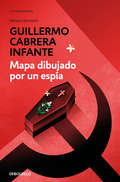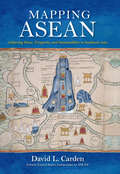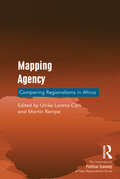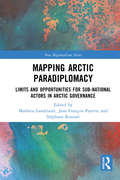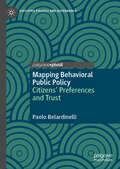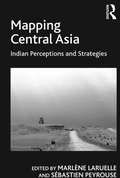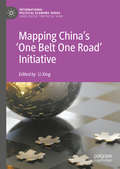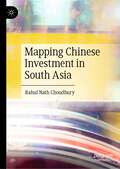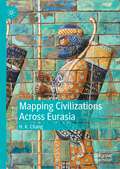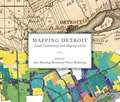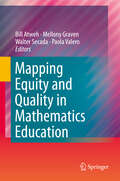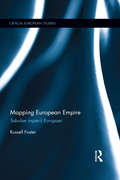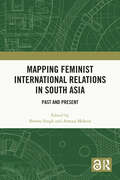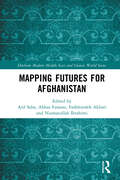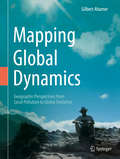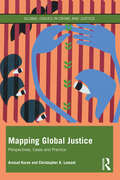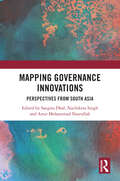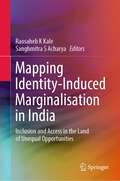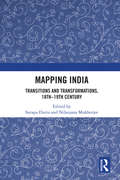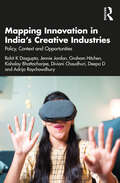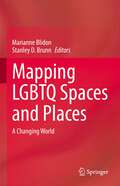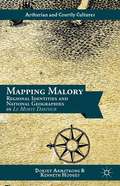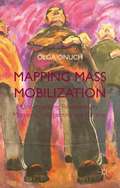- Table View
- List View
Mapa dibujado por un espía
by Guillermo Cabrera InfanteLas memorias más políticas de Guillermo Cabrera Infante, crónica de su desencanto ante la Revolución y su decisión de exiliarse definitivamente Libro de memorias casi secreto e inédito a la muerte del autor, Mapa dibujado por un espía narra los apuros que vivió Guillermo Cabrera Infante en el verano de 1965, cuando regresó a Cuba desde Bélgica para asistir al entierro de su madre. Fue el momento de abrir los ojos a la vertiente totalitaria de la Revolución, cuyas autoridades le negaron la visa de salida, obligándolo a permanecer cuatro meses en la isla hasta encontrar una nueva vía de escape a Europa. La crónica de ese tiempo muerto refleja un mundo espectral y desmoronado, así como el desconcierto de quien no consigue despertar de las pesadillas de la Historia. Reseñas:«La narración implacable de un proceso moral y el testimonio de una decisión valiente.»Enrique Macari, Letras Libres «Conmovedor, lúcido, elegante, honrado en la desnudez con la que se muestra ante el lector.»Ernesto Calabuig, El Cultural
Mapping ASEAN: Achieving Peace, Prosperity, and Sustainability in Southeast Asia
by David L. CardenFor half a century, ten dynamic nations in Southeast Asia have been implementing a shared vision of economic growth, sustainable development, and cultural progress. Today, the economies of those nations are linked inextricably with the future of greater Asia as well as with the United States and the other Western countries. With authoritarianism and protectionism on the rise around the world and the catastrophic effects of global warming making action urgent, the nations that form the Association of Southeast Asia Nations are more relevant and under greater political and social stress than ever. In these illuminating pages, David Carden, the first American resident ambassador to ASEAN, paints a vivid portrait of the regional and global cooperation required to meet today, and interconnected future. Carden takes us behind the scenes as the leaders of these ten nations work to prepare their countries and their region for the 21st century. Carden persuasively argues that the unfolding story of the ASEAN nations is a story for the entire worldthat we are all increasingly interdependent and confronted with the existential need to solve the same set of challenges.
Mapping Agency: Comparing Regionalisms in Africa (The International Political Economy of New Regionalisms Series)
by Ulrike Lorenz-Carl Martin RempeDespite regionalism having developed into a global phenomenon, the European Union (EU) is still more often than not presented as the ’role-model of regionalism’ whose institutional designs and norms are adopted by other regional actors and organizations as part of a rather passive ’downloading process’. Reaching beyond such a Eurocentric perception, Mapping Agency provides an empirically rich ’African perspective’ on regionalisms in Sub-Saharan Africa. It adopts an actor-centred approach but departs from a rather simplified understanding of agency as exerting power and instead scrutinizes to what extent actors actually participate in or are excluded from processes of regionalism. The value of this volume derives from the inclusion of historical dimensions, its open multi-actor approach to both formal and informal processes and its comparative perspective within but also beyond Sub-Saharan Africa. The chapters offer a multifaceted picture of agency beyond disciplinary divides where the EU is one actor amongst many and where local, national, regional and global state and non-state actors shape - and sometimes break - processes of regionalisms in Sub-Saharan Africa.
Mapping Arctic Paradiplomacy: Limits and Opportunities for Sub-National Actors in Arctic Governance (New Regionalisms Series)
by Mathieu LandriaultThis book analyses the possibilities and limitations that sub-national actors face when developing diplomatic activities in the Arctic region. Sub-national actors, such as civil society groups and sub-national governments or administrations, have been active in international relations for decades. They face specific political and economic limitations on the international scene as non-sovereign entities. This book investigates how these actors have developed their international presence in the Arctic region. It analyzes the diplomatic activities of states, provinces, regional administrations, and multilateral forums made of sub-national governments to offer comparative insights on the strategies, interests, and activities of sub-national governments. Alaska, Scotland, Quebec, Yakutsk, and Indigenous People’s organizations are among the examples covered in this book that have forged bilateral and multilateral relations to promote and defend their interests and values. Moreover, sovereign states are often using these sub-national actors to further their own interests, as exemplified in this book in how Russia and China harnessed the potential of sub-national governments to align with their Arctic policies. The volume will be useful to academics and graduate students of Arctic politics, international relations, comparative politics, comparative federalism, foreign policy, and global governance.
Mapping Behavioral Public Policy: Citizens' Preferences and Trust (Executive Politics and Governance)
by Paolo BelardinelliThis book provides a new perspective on behavioral public policy. The field of behavioral public policy has been dominated by the concept of ‘nudging’ over the last decade. As this book demonstrates, however, ‘nudging’ is one of many behavioral techniques that practitioners and policymakers can utilize in order to achieve their goals. The book discusses the advantages and disadvantages of these alternative techniques, and demonstrates empirically how the impact of ‘nudging’ and ‘non-nudging’ interventions are often dependent on varying political contexts and the degree of trust that citizens have toward policymakers. In doing so, it addresses the important question of how citizens understand and approve of the use of behavioral techniques by governments. The book will appeal to all those interested in public management, public policy, behavioral psychology, and ‘nudging’.
Mapping Central Asia: Indian Perceptions and Strategies
by Sébastien PeyrouseWith renewed American involvement in Afghanistan, Pakistan's growing fragility, and China's rise in power in the post-Soviet space, Central Asia-South Asia relations have become central to understanding the future of the Eurasian continent. Mapping Central Asia identifies the trends, attitudes, and ideas that are key to structuring the Central Asia-South Asia axis in the coming decade. Structured in three parts, the book skillfully guides us through the importance of the historical links between the Indian sub-continent and Central Asia, the regional and global context in which the developing of closer relations between India and Central Asia has presented itself since the collapse of the Soviet Union, the precise domains of Indo-Central Asian cooperation, and studies three conflict zones that frame Indo-Central Asian relations: the Kashmir question; the situation in Afghanistan; and fear of destabilization in Xinjiang. The international line-up of established scholars convincingly demonstrate the fundamental necessity to define the Indian approach on these issues and provide cutting-edge insights on the tools needed to understand the solutions for the decade to come.
Mapping China’s ‘One Belt One Road’ Initiative (International Political Economy)
by Li XingThis book sets out to analyze how the OBOR initiative will influence the world’s geo-political and geo-economic environment, with specific regard to the ‘Belt and Road’ countries and regions. It evaluates what opportunities the OBOR can offer them in light of the constraints they face, paying particular attention to how security issues may keep some nations from fully participating. Questions are also asked about the tension and conflict along the ‘Belt’ and ‘Road’, which, after all takes in the Middle East’s most tumultuous regions, as well as the much disputed South China Sea. Finally, consideration is given as to how the world’s other economic powers will react when the OBOR inevitably brings about capital and resource competitions.
Mapping Chinese Investment in South Asia
by Rahul Nath ChoudhuryThis book attempts to capture the tremendous growth in Chinese investment in the South Asian region in the recent past. It makes country-wise analysis of the factors that led to the growth of Chinese investment in the region and explores the nature and role of such investment in expanding trade in the region. It also discusses in detail the Chinese infrastructure investment through Belt and Road Initiative (BRI). Interestingly, despite being the major investor in several countries, Chinese investment has been seen with some level of doubt. Apprehension about Chinese investment has forced countries to suspend China-funded projects or amend their investment policies. This book tries to address these crucial issues while exploring and analyzing the causes and effects of the same.
Mapping Civilizations Across Eurasia
by H. K. ChangThis book is a history reader and cultural primer for students and aspiring scholars of past and contemporary interactions among civilizations over the Eurasian landmass. Tracing a human journey that spans several million years, this general survey of civilizations comprises seven sections: Studies on Civilization, Silk Road, Survey of Greater Central Asia, Portrait of India, Persian Cultural Sphere, Caucasus, and Turkish March. The first section introduces methodologies and perspectives for civilization studies. The second focuses on the concept and connotations of the ancient Silk Road as well as China's 21st-century strategic Belt & Road Initiative. In the remaining five sections, the trilingual, peripatetic author, based on his experiences and reflections, provides introductions to and comments on the history, literature, art, social tensions, and future development of five key areas along the Silk Road, i.e., Central Asia, India, Iran, Caucasus, and Turkey.
Mapping Detroit: Land, Community, and Shaping a City (Great Lakes Books Series)
by June Manning Thomas Henco BekkeringOne of Detroit's most defining modern characteristics--and most pressing dilemmas--is its huge amount of neglected and vacant land. In Mapping Detroit: Land, Community, and Shaping a City, editors June Manning Thomas and Henco Bekkering use chapters based on a variety of maps to shed light on how Detroit moved from frontier fort to thriving industrial metropolis to today's high-vacancy city. With contributors ranging from a map archivist and a historian to architects, urban designers, and urban planners, Mapping Detroit brings a unique perspective to the historical causes, contemporary effects, and potential future of Detroit's transformed landscape. To show how Detroit arrived in its present condition, contributors in part 1, Evolving Detroit: Past to Present, trace the city's beginnings as an agricultural, military, and trade outpost and map both its depopulation and attempts at redevelopment. In part 2, Portions of the City, contributors delve into particular land-related systems and neighborhood characteristics that encouraged modern social and economic changes. Part 2 continues by offering case studies of two city neighborhoods--the Brightmoor area and Southwest Detroit--that are struggling to adapt to changing landscapes. In part 3, Understanding Contemporary Space and Potential, contributors consider both the city's ecological assets and its sociological fragmentation to add dimension to the current understanding of its emptiness. The volume's epilogue offers a synopsis of the major points of the 2012 Detroit Future City report, the city's own strategic blueprint for future land use. Mapping Detroit explores not only what happens when a large city loses its main industrial purpose and a major portion of its population but also what future might result from such upheaval. Containing some of the leading voices on Detroit's history and future, Mapping Detroit will be informative reading for anyone interested in urban studies, geography, and recent American history.
Mapping Equity and Quality in Mathematics Education
by Paola Valero Mellony Graven Bill Atweh Walter SecadaConcerns about quality mathematics education are often posed in terms of the types of mathematics that are worthwhile and valuable for both the student and society in general, and about how to best support students so that they can develop this mathematics. Concerns about equity are about who is excluded from the opportunity to develop quality mathematics within our current practices and systems, and about how to remove social barriers that systematically disadvantage those students. This collection of chapters summarises our learning about the achievement of both equity and quality agendas in mathematics education and to move forward the debate on their importance for the field.
Mapping European Economic Integration
by Amy Verdun Alfred ToviasBy examining the various policy subfields of European economic integration such as agriculture, trade, banking, economic governance and sustainability this book offers a comprehensive and wide-ranging analysis of developments that have taken place in the past five years aimed at exploring the path of economic integration in Europe.
Mapping European Empire: Tabulae imperii Europaei (Critical European Studies #5)
by Russell FosterEmpire and maps are mutually reliant phenomena and traceable to the dawn of civilisation. Furthermore, maps retain a supremely authoritative status as unquestioned reflections of reality. In today’s image-saturated world, their influence is more powerful now than at any other time in history. This book argues that in the 21st century we are seeing an imperial renaissance in the European Union (EU), a political organisation which defies categorisation, but whose power and influence grows by the year. It examines the past, present, and future of the EU to demonstrate that empire is not a category of state but rather a collective imagination which reshapes history and appropriates an artificial past to validate the policies of the present and the ambitions of the future. In doing so, this book illuminates the imperial discourse that permeates the mass maps of the modern EU. This text will be of key interest to students and scholars of political science, EU Studies, Human Geography, European political history, cartography and visual methodologies and international relations.
Mapping Extreme Right Ideology
by Sarah Harrison Michael BruterWhy is the discourse of extreme right parties so hard to characterize? Why are some parties so much more successful than others? And why do they even seem to attract different kinds of voters? This book proposes a new multidimensional model of extreme right politics based on alternative expressions of negative identity and authoritarianism. The model is comprehensively tested across 17 European political systems and 25 parties, using a text-analysis of party manifestoes and press releases over time, a mass survey of extreme right voters, interviews with leaders and a systematic decryption of parties' electoral results over 30 years. The book shows how the European extreme right is 'mapped' by the various ideological positions espoused by parties and voters, and how the 'match' between parties' discourses and voters' preferences determines the evolution of extreme right ideology, patterns of competition, and ultimately dynamics of electoral success.
Mapping Feminist International Relations in South Asia: Past and Present
by Amena Mohsin Shweta SinghThis book provides a comprehensive overview of feminist international relations in South Asia. It highlights the key contentions, debates, and tensions in the field, and studies how the trajectory of feminist international relations in the region has been marked by dialogue, dissidence, and difference with the Global North. In doing so, the volume draws attention to different feminist histories, herstories, and differing ways of knowing, seeing, and doing global politics. It particularly foregrounds a feminist intersectional/ postcolonial lens to a diverse range of issues such as women, peace and the security agenda, populism and nationalism, militarism and militarisation, and underlines the rich textured contours of feminist epistemologies in South Asia. An important contribution, the book will be of great interest to scholars, teachers, and students of feminism, international relations, postcolonialism, women’s studies, gender studies, security studies, and South Asian studies.
Mapping Futures for Afghanistan (Durham Modern Middle East and Islamic World Series)
by Farkhondeh Akbari Abbas Farasoo Arif SabaMapping Futures for Afghanistan offers a critical and forward-looking exploration of Afghanistan’s most pressing challenges and future possibilities. It examines the current crises posed by the Taliban’s return to power and the collapse of the Republic in August 2021 and maps a range of challenges and solutions that will shape the country’s long-term future.As the first volume of its kind to be entirely produced by scholars from Afghanistan, it critically engages with the dominant narratives and re-imagines the country’s path toward a just, pluralistic and democratic future. Featuring original contributions from leading experts, the volume critically examines Afghanistan’s political, economic, human rights, and geopolitical challenges - while exploring potential solutions. It foregrounds local knowledge and perspectives that are often excluded from mainstream policy and academic discourses. This timely collection will be of interest to a wide range of audiences, including policymakers, practitioners, scholars and students with an interest in Afghanistan and the broader processes and challenges of inclusive peacebuilding and conflict resolution in war-torn societies.
Mapping Global Dynamics: Geographic Perspectives from Local Pollution to Global Evolution
by Gilbert AhamerThis book asks: What are the most suitable “mapping strategies” for detecting patterns of global dynamics?It adopts a spatial perspective when trying to understand “Global Dynamics” – and sets out to revolutionise the concept of space as such. Spatial views – on levels of increasing abstraction, reflection and self-organisation – are developed along eight case studies including air emissions, environmental radioactivity, deforestation, energy from biomass, land use change, food supply, water quality and cooperative interdisciplinary learning for global change.This book’s conceptual innovation consists in performing a transformation from “space & time” into “functional state space & evolutionary time” in order to better recognise the structural patterns of long-term global dynamics. A transdisciplinary readership in academia – including geography, philosophy, economics, global change and future research – that is interested in enlarging scientific concepts beyond classical borders – would be most welcome!
Mapping Global Justice: Perspectives, Cases and Practice (Global Issues in Crime and Justice)
by Christopher K. Lamont Arnaud KurzePersistent international conflicts, increasing inequality in many regions or the world, and acute environmental and climate-related threats to humanity call for a better understanding of the processes, actors and tools available to face the challenges of achieving global justice. This book offers a broad and multidisciplinary survey of global justice, bridging the gap between theory and practice by connecting conceptual frameworks with a panoply of case studies and an in-depth discussion of practical challenges. Connecting these critical aspects to larger moral and ethical debates is essential for thinking about large, abstract ideas and applying them directly to specific contexts. Core content includes: Key debates in global justice from across philosophy, postcolonial studies, political science, sociology and criminology The origins of global justice and the development of the human rights agenda; peacekeeping and post-conflict studies Global poverty and sustainable development Global security and transnational crime Environmental justice, public health and well-being Rather than providing a blueprint for the practice of global justice, this text problematizes efforts to cope with many justice related issues. The pedagogical approach is designed to map the difficulties that exist between theory and praxis, encourage critical thinking and fuel debates to help seek alternative solutions. Bringing together perspectives from a wealth of disciplines, this book is essential reading for courses on global justice across criminology, sociology, political science, anthropology, philosophy and law.
Mapping Governance Innovations: Perspectives from South Asia
by Sangita Dhal, Nachiketa Singh and Amir Mohammad NasrullahThis volume explores the nature, success, and challenges of governance innovations in South Asia. It compares innovations and reforms that have been undertaken specifically in Bangladesh, Bhutan, India, Nepal, Pakistan, and Sri Lanka. It examines how these South Asian nations have fared in promoting the values of good governance both at the national and local levels.The volume focuses mainly on three themes innovations and reforms in public administration, e-governance, public service delivery and innovations in local governance. It assesses how South Asian countries have sought to mitigate the challenges of governance and overcome the obstacles that characterized the transition from the old, traditional architecture of governance to the new and modern technologically enabled models of governance.Lucid and topical, this book will be of great interest to scholars of politics, public administration and governance, public policy, public management, international relations, development studies, and related social science disciplines.
Mapping Identity-Induced Marginalisation in India: Inclusion and Access in the Land of Unequal Opportunities
by Raosaheb K Kale Sanghmitra S AcharyaThis book discusses the issues of inequality and marginalization in India. The first section of the book contextualizes sociological traditions for the scrutiny of subaltern discourse on discrimination. The chapters in the section explore self-identity, ‘margins’ in sociological traditions, subalternity and exclusion, citizenship issues of de-notified tribes, the role of religion for scheduled tribe Dalits and Ambedkar’s ideas on tribes. The second section deals with the political economy of higher education, health and employment. The efforts of BR Ambedkar and the consequences of those efforts, his critique of education policies during British time and its alteration for independent India have been meticulously dealt with. The third section illustrates an application of theoretical understanding through narratives of labour bondage in Varanasi, sanitation workers in Mumbai and rickshaw pullers in Delhi. The last section establishes that unequal access to resources is a consequence of discrimination and marginalization induced by social identities. The book argues for equitable access to resources and opportunities to ensure health equity. The audience for this publication includes academics, researchers, health professionals, policymakers engaged with discrimination, exclusion, marginalization and inequity in health.
Mapping India: Transitions and Transformations, 18th–19th Century
This book presents an alternate history of colonial India in the 18th and the 19th centuries. It traces the transitions and transformations during this period through art, literature, music, theatre, satire, textiles, regime changes, personal histories and migration. The essays in the volume examine historical events and movements which questioned the traditional parameters of identity and forged a new direction for the people and the nation. Viewing the age through diverse disciplinary angles, the book also reflects on the various reimaginings of India at the time. This volume will be of interest to academics and researchers of modern Indian history, cultural studies and literature. It will also appeal to scholars interested in the anthropological, sociological and psychological contexts of imperialism.
Mapping Innovation in India’s Creative Industries: Policy, Context and Opportunities
by Kishalay Bhattacharjee Jennie Jordan Rohit K Dasgupta Graham Hitchen Diviani Chaudhuri Deepa D Adrija RoychowdhuryThe first in-depth study of the Indian creative industries, this book provides a comprehensive mapping of the Indian creative industries and its policy landscape, developing and defining key concepts and terms and offering detailed case studies of specific sectors, geographic regions and governance structures. Using an ecosystem framework, this book focuses on strategy/policy; tangible and intangible infrastructure; and funding and investment to understand the main drivers and barriers across nine sub-sector value chains. With investment from global brands into many sectors, it tracks how Indian creative industries are fostering innovation and design for social and ecological sustainability. It also delves into India’s informal economy to share key policy insights. The volume will be of great interest to scholars and researchers of public policy, business studies and South Asian studies. It will also be a key document for foreign investors willing to invest in one of the fastest-growing and stable economies in the world.
Mapping LGBTQ Spaces and Places: A Changing World
by Donna Gilbreath Maria Rodó-Zárate Michal PitoňákThis book addresses LGBTQ issues in relation to among others law and policy, mobility and migration, children and family, social well-being and identity, visible and invisible landscapes, teaching and instruction, parades, arts and cartography and mapping. A variety of research methods are used to explore identities, communities, networks and landscapes, all which can be used in subsequent research and classroom instruction and disciplinary and interdisciplinary levels. This extensive book stimulates future pioneering research ventures in rural and urban settings about existing and proposed LGBTQ policies, individual and group mapping, visible and invisible spaces, and the construction of public and private spaces. Through the methodologies and rich bibliographies, this book provides a rich source for future comparative research of scholars working in social work, NGOs and public policy, and community networking and development.
Mapping Malory
by Dorsey Armstrong Kenneth HodgesMedievalists are increasingly grappling with spatial studies. This timely book argues that geography is a crucial element in Sir Thomas Malory's M orte Darthur and contributors shine a light on questions of politics and genre to help readers better understand Malory's world.
Mapping Mass Mobilization
by Olga OnuchThrough a paired comparison of two moments of mass mobilization, in Ukraine and Argentina, focusing on the role of different actors involved, this text maps out a multi'layered sequence of events leading up to mass mobilization.
